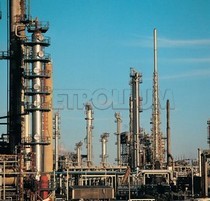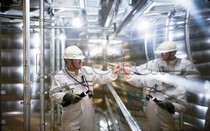Kioge-2011
The modern classification society: helping to manage the interaction between people, plant and process
Chris Renwick, General Director, Lloyd’s Register Kazakhstan LLP

The first classification society may have been formed more than 250 years ago solely to support the merchant fleet, but today’s technical experts provide support to most industries that operate high-risk, capital-intensive assets, ranging from ships, rail networks and chemical plants to civil nuclear facilities and deepwater drilling rigs.
And the role of the class society continues to evolve, particularly to support an offshore industry that becomes technically more complex every day as it ventures into hazardous environs in search of the last stores of fossil fuels.
Basic class and statutory services such as verification and certification no longer fully satisfy the needs of modern offshore practitioners. A host of technical-consultancy acti-vities are needed to supplement what has become a «class-plus» menu, from which clients can select bespoke, integrated solutions to fit often complex, technical requirements.
Far from their genesis as the simple inspectors of ships, on any given day, modern class societies may be asked to provide:
- Complex structural analysis and fatigue assessments
- Advanced materials and corrosion engineering, including fracture mechanics assessments
- FOI response and advanced hull-structural analyses, including of associated mooring and riser systems
- Process engineering studies to support more complex facilities (such as LNG and nuclear) =Project management
- Safety case-related studies such as fire and explosion modelling and analysis, emergency response and survivability analyses
- Technical trouble-shooting (particularly with respect to rotating machinery and vibration engineering, which require complex analytical assessments)
- Comprehensive asset-integrity services (incorporating identification of hazards, prevention, mitigation and control measures, provision of inspection and maintenance management)
- Commissioning supervision and rig-condition assessments
- Energy efficiency management systems
- Human factors services, such as examining the safety culture of a workforce
Because class is a service provider, the evolution of its technical services is driven by the changing demands of and on its client-group, the asset-owner or operator.
For example, a maturing asset base in the energy sector is increasing demand for asset-integrity solutions as owners look to extend the lives of their assets without compromising safety or operational efficiency.
At the same time, the shift to recovering fossil fuels from comparatively remote areas such as in deeper waters and the Russian Arctic is driving demand for an unprecedented level of new, innovative technical and risk-related solutions as terms such as ‘FLNG’ and ‘ice-strengthened’ enter the industry lexicon.

The post-Macondo era has seen many multinationals reach out to third parties for technical solutions and validation as the value of independent assurance is recognised and, in some cases, becomes mandatory. And the transition away from prescriptive safety regimes towards safety-case models that allocate related resources proportionate to the risk is driving demand for bespoke risk-management strategies to fit a diversity of risk profiles.
In short, modern class societies have to offer technical solutions that recognise an industry’s legacy, while driving the research and employee development that will help to ensure that same industry builds the infrastructure and systems it needs to meet future challenges.
Planning for the future always involves a degree of uncertainty. But, from operational and safety perspectives, what is clear is that owners and operators in asset-intensive industries say they need to better understand the influence that the workforce has on asset performance.



